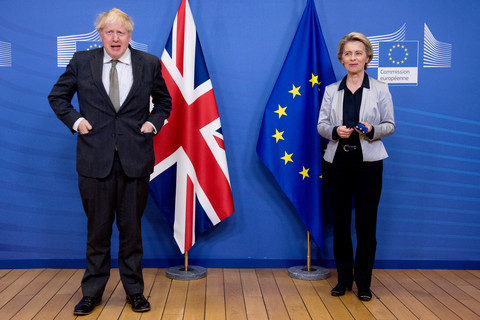[ad_1]

The EU-UK future relationship deal will be signed today, separately, and without pomp on the two sides of the Channel.
EU Commission president Ursula von der Leyen and European Council president Charles Michel will sign two copies of the set of treaties on Wednesday (30 December) morning, in the Europa building in Brussels.
The two copies will then travel to London for British prime minister Boris Johnson to sign them in the afternoon. One original copy will be sent back to Brussels.
All versions are bound in blue leather, according to an EU official, the ones staying in Brussels have blue stars on their cover.
Here are the key points of the 1,246-page long agreement, which is the result of nine months of intense negotiations in the middle of a pandemic.
Fair competition
One of the ideas that almost derailed talks, the level playing field, was also fought over what Britain sees as the core of its sovereignty.
The deal commits both the UK and the EU to maintain common standards on workers’ rights, and many social, environmental, and tax transparency rules, to make sure they do not undercut each other.
The deal does not force the UK to follow the development of EU law, and either side can retaliate with tariffs if they diverge too much.
Any retaliatory measures will be subject to arbitration by an independent panel, but not the European Court of Justice – a key demand of Britain’s.
Another way to ensure fair competition was to agree on rules on state aid.
Neither the UK nor the EU can give an unlimited state guarantee to cover a company’s debts or liabilities, in accordance with EU rules.
The UK also agreed to stick to common principles on how state-aid regimes work and to disclose subsidies. The UK will set up an independent agency to assess them after evidence for unfair competition is presented.
Dispute settlement
Another tough hurdle in talks was finding ways to settle arguments and remedy breaking the deal without the involvement of the European Court of Justice.
(The ECJ will, however, still play a part in Northern Ireland, which remains subject to EU single market and customs union rules.)
If either side moves away from common standards, which has a negative impact, a dispute mechanism can be triggered which could lead to tariffs. Tariffs can be targeted at a specific sector.
There will be a binding arbitration system, involving officials from both sides.
More red tape
Goods moving between the UK and the EU will be subject to customs, regulatory, and animal safety checks, leading to more red tape. Both the EU and UK pledge to minimise bureaucracy, however.
UK firms will also have to certify the origin of their exports to qualify for tariff-free access to the EU.
The goods will not face tariffs or quotas, but the bureaucratic burden will put some firms out of business.
End of free movement
Free movement between British and EU nationals will end, although short stays remain visa-free.
EU citizens’ right to live, work, and study in the UK – and vice versa – will diminish.
Phone roaming charges will be back from January for anyone crossing between the UK and the EU.
Data and security
There will be significant changes to the way Britain and the EU will share security, police, and intelligence data.
The UK will no longer participate in Europol or Eurojust, and will lose access to the Schengen Information System.
There are ways to share data within law enforcement, share passenger, fingerprints, DNA and vehicle data, but it is not “real-time” access and the agreement also stresses individuals’ rights to the protection of personal data and privacy.
There will be a temporary solution to keep data flowing until the EU has adopted a data-adequacy decision, saying the UK’s data-protection standards are good enough.
Disagreements over data will be dealt with by a new committee, not by the European Court of Justice.
Fishing
One of the major stumbling blocks in negotiations, the politically sensitive agreement of fishing now includes a five and a half-year transition period from 2021 during which full access to each other’s waters ends and quotas will be introduced.
Some 25 percent of EU boats’ fishing rights in British waters will be transferred to the UK fishing fleet, which is a lot less than what London initially asked for.
After that, annual talks will set the amount EU boats can catch in British waters and vice versa.
The EU would be able to impose tariffs on fish if its access to British waters was limited.
Financial services
Meanwhile, British-based financial services firms will lose automatic access to the EU’s single market.
There is no decision on so-called equivalence, which would allow firms to sell services to the single market, and the EU Commission says it needs more information from the UK on the issue before making the call.
The two sides said they will try to agree by March 2021 on a memorandum of understanding on regulatory cooperation in financial services.
Professional qualifications
These will not be recognised automatically.
UK professionals will need to to have their qualifications recognised in the specific member state they want to work in and EU citizens will have to get recognised in the UK.
There is a framework in the deal for the UK and EU to agree on mutually recognising individual qualifications in the future, but that is expected to be weaker than what EU membership secures.
[ad_2]
Source link